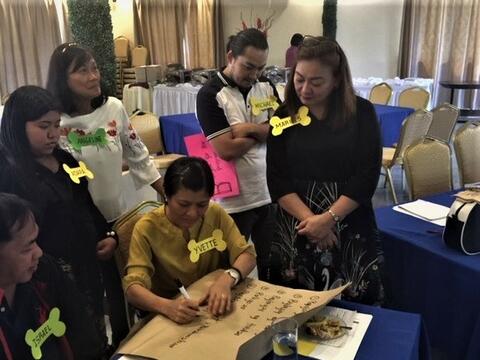Philippine health professionals gear up to teach rabies prevention to 21 million school children
To expand the pool of rabies educators in the Philippines to include non-classroom personnel, the Department of Education conducted a national workshop to equip school health personnel with rabies knowledge and new strategies for teaching children about the fatal disease. The workshop, entitled the National Orientation on Integration of Rabies Education in the National Curriculum, was held in May for more than 40 doctors, nurses, and dentists from almost all regions in the Philippines in preparation for the integration of new rabies lesson plans into the public school curricula, which has the potential to reach more than 21 million students this upcoming school year.
Workshop facilitators used non-lecture style activities such as group activities, games, and song and to teach participants about rabies as a disease, anti-rabies policies, and misconceptions about rabies. Participants were also introduced to the new lesson plans that will integrate rabies education into the school curriculum. In addition, trainees were tasked with developing an action plan for the upcoming school year. The recommendations for new rabies education activities included conducting a national rabies quiz bee, and celebrating rabies-related events such as Rabies Awareness Month and World Rabies Day in schools.
Participants were enthusiastic about the workshop and the goal to eliminate rabies from the Philippines by 2030. Dr. Rosalia Vivien Maninang, a dentist interested in health education, said,"The training made me realize that we as health personnel should have ownership of the rabies program. Even though we are considered as non-teaching personnel, I realized that we have a very important role in implementing the program so that we will be able to protect children from rabies.” Dr. Annaliza Araojo, also a dentist, thought the teaching style implemented during the workshop was effective, indicating that "I greatly enjoyed the method of delivery since it is not the usual lecture style."
To help trainees fully understand the rabies situation in the Philippines, representatives from the Disease Prevention and Control Bureau and the Bureau of Animal Industry gave a technical lecture on the national rabies program. Funding for this was provided by the Bureau of Learner Support Services of the Department of Education, which also conducted a writing workshop last May where content for this national training was developed. Workshop attendees also created regional rabies education programs specific for their own regions, which were supported by USD 1,000 grants that were allocated to each region from the national rabies program.
In addition to providing first aid to bite victims and referrals to bite centers, health professionals left the workshop with a new focus on integrating rabies lesson plans into their health education classes on animal bite management and responsible pet ownership.
Contributed by Dr. Sarah Jayme, GARC Asia Representative

